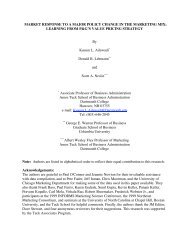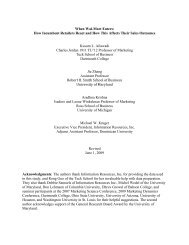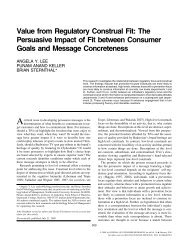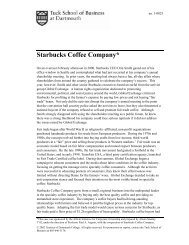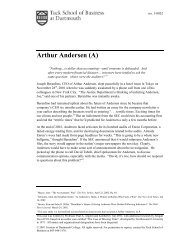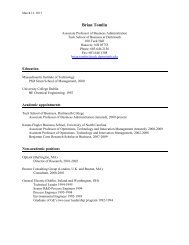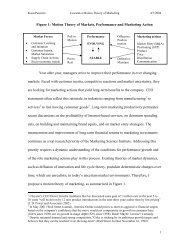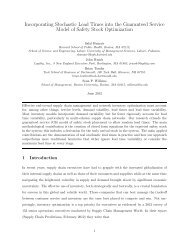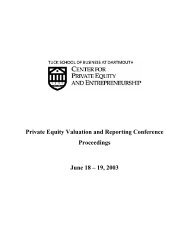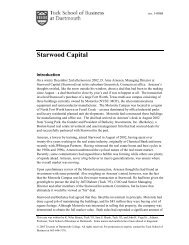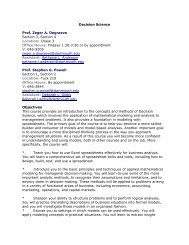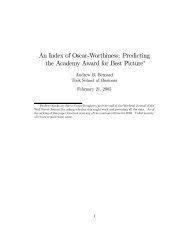tax notes international - Tuck School of Business - Dartmouth College
tax notes international - Tuck School of Business - Dartmouth College
tax notes international - Tuck School of Business - Dartmouth College
Create successful ePaper yourself
Turn your PDF publications into a flip-book with our unique Google optimized e-Paper software.
SPECIAL REPORTS<br />
that either avoids the characterization <strong>of</strong> an agency<br />
PE 22 or provides for an optimal allocation <strong>of</strong> functions,<br />
assets, and risks to shift income to a low-<strong>tax</strong> jurisdiction.<br />
Taking into account a particular company willing to<br />
distribute its goods in a foreign country, there are basically<br />
two distribution models that may be adopted to<br />
accomplish this goal: (i) the buy-sell model, involving a<br />
local distributor that may be related to the company,<br />
and (ii) the agency model. Both models have their variances,<br />
triggering different <strong>tax</strong> consequences, and <strong>of</strong>ten<br />
multinational enterprises play around with the features<br />
<strong>of</strong> each model to shift income to a low-<strong>tax</strong> jurisdiction<br />
(for example, by using a limited risk distribution<br />
model, under which part <strong>of</strong> the risk is shifted from the<br />
distributor to the principal, so the former is entitled to<br />
a lower pr<strong>of</strong>it). Essentially, the allocation <strong>of</strong> functions,<br />
assets, and risks will determine the arm’s-length remuneration<br />
<strong>of</strong> a distributor in a buy-sell model. However,<br />
one <strong>of</strong> the main <strong>tax</strong> consequences <strong>of</strong> the agency model<br />
is the possibility <strong>of</strong> the constitution <strong>of</strong> an agency PE in<br />
the host state once the requirements <strong>of</strong> article 5, paragraph<br />
5 <strong>of</strong> the OECD model <strong>tax</strong> convention are met.<br />
Because <strong>of</strong> the extensive use <strong>of</strong> the OECD model<br />
convention and its commentary and the development<br />
<strong>of</strong> case law and doctrine, it can be said that nowadays<br />
the characterization <strong>of</strong> an agency PE is not as complicated<br />
as it was in the past, although it still requires a<br />
case-by-case analysis. Nonetheless, an open question,<br />
both to <strong>tax</strong> authorities and <strong>tax</strong>payers, is how much<br />
pr<strong>of</strong>its must be attributed to that PE.<br />
III. Subsidiary Constituting an Agency PE<br />
Before addressing the core issue <strong>of</strong> the different approaches<br />
to attribute pr<strong>of</strong>its to agency PEs, attention<br />
should be given to the particular phenomenon <strong>of</strong> a<br />
subsidiary constituting an agency PE <strong>of</strong> its foreign parent<br />
company, as this might lead to different consequences<br />
regarding the attribution <strong>of</strong> pr<strong>of</strong>its to that PE.<br />
The provisions <strong>of</strong> article 5, paragraph 7 <strong>of</strong> the<br />
OECD model <strong>tax</strong> convention set forth that:<br />
the fact that a company which is a resident <strong>of</strong> a<br />
contracting state controls or is controlled by a<br />
company which is a resident <strong>of</strong> the other contracting<br />
state, or which carries on business in that<br />
other state (whether through a PE or otherwise),<br />
shall not <strong>of</strong> itself constitute either company a PE<br />
<strong>of</strong> the other.<br />
This ‘‘anti-single-entity’’ clause makes clear that a<br />
subsidiary should not be considered a PE <strong>of</strong> its parent<br />
company for the mere fact <strong>of</strong> their corporate relationship<br />
(that is, that they belong to the same group <strong>of</strong><br />
companies).<br />
22 Arnold, supra note 12, at 483.<br />
The commentaries on article 5, paragraph 7 <strong>of</strong> the<br />
OECD model <strong>tax</strong> convention reaffirm this rule and<br />
stress that the fact that the trade or business carried on<br />
by the subsidiary company is managed by the parent<br />
company is not sufficient to consider the former a PE<br />
<strong>of</strong> the latter.<br />
However, it is also generally accepted that the subsidiary<br />
cannot hide behind its independent legal status<br />
to avoid an agency PE characterization because ‘‘there<br />
is no reason why a subsidiary company acting as an<br />
agent <strong>of</strong> its parent company should be treated differently<br />
than a third party acting as an agent.’’ 23 In the<br />
same way, the commentaries on article 5, paragraph 7<br />
provide for this possibility.<br />
As will be demonstrated below, several decisions<br />
were issued recently recognizing the existence <strong>of</strong> a subsidiary<br />
constituting a PE <strong>of</strong> its parent company. The<br />
decisions were not always received by the <strong>international</strong><br />
<strong>tax</strong> community free <strong>of</strong> criticism.<br />
A. Interhome<br />
The Interhome case24 involves a decision <strong>of</strong> the Conseil<br />
d’Etat (Supreme Administrative Court <strong>of</strong> France)<br />
ruling that a French subsidiary (Interhome Gestion)<br />
may constitute an agency PE <strong>of</strong> its Swiss parent company<br />
(Interhome AG), but only if the former:<br />
• cannot be regarded as an independent agent <strong>of</strong> its<br />
parent company; and<br />
• habitually exercises an authority to bind the Swiss<br />
parent in commercial activities that are related to<br />
those <strong>of</strong> the parent.<br />
Interhome AG is a group <strong>of</strong> companies headquartered<br />
in Switzerland engaged in the business <strong>of</strong> renting<br />
holiday accommodations. In this context, Interhome<br />
AG concluded mandate contracts with owners in several<br />
European countries and promoted the houses in a<br />
catalogue, while its subsidiary in France — Interhome<br />
Gestion — was responsible for the proper execution <strong>of</strong><br />
these contracts within the French territory. 25 (See Figure<br />
1.)<br />
Under this scenario, French <strong>tax</strong> authorities argued<br />
that Interhome Gestion should be considered an<br />
agency PE <strong>of</strong> Interhome AG and therefore the income<br />
received by the latter, comprised <strong>of</strong> commission on the<br />
rents, should be <strong>tax</strong>ed in France as pr<strong>of</strong>its attributable<br />
to that PE. 26<br />
23<br />
Arthur Pleijseir, ‘‘The Agency Permanent Establishment,<br />
Practical Applications. Part Two,’’ Inter<strong>tax</strong>, Vol. 29, Nos. 6-7,<br />
(2001), pp. 223-224.<br />
24<br />
Conseil d’Etat (Supreme Administrative Court <strong>of</strong> France),<br />
June 20, 2003, decision 224407.<br />
25<br />
Id.<br />
424 • FEBRUARY 2, 2009 TAX NOTES INTERNATIONAL<br />
26 Id.<br />
(C) Tax Analysts 2009. All rights reserved. Tax Analysts does not claim copyright in any public domain or third party content.



